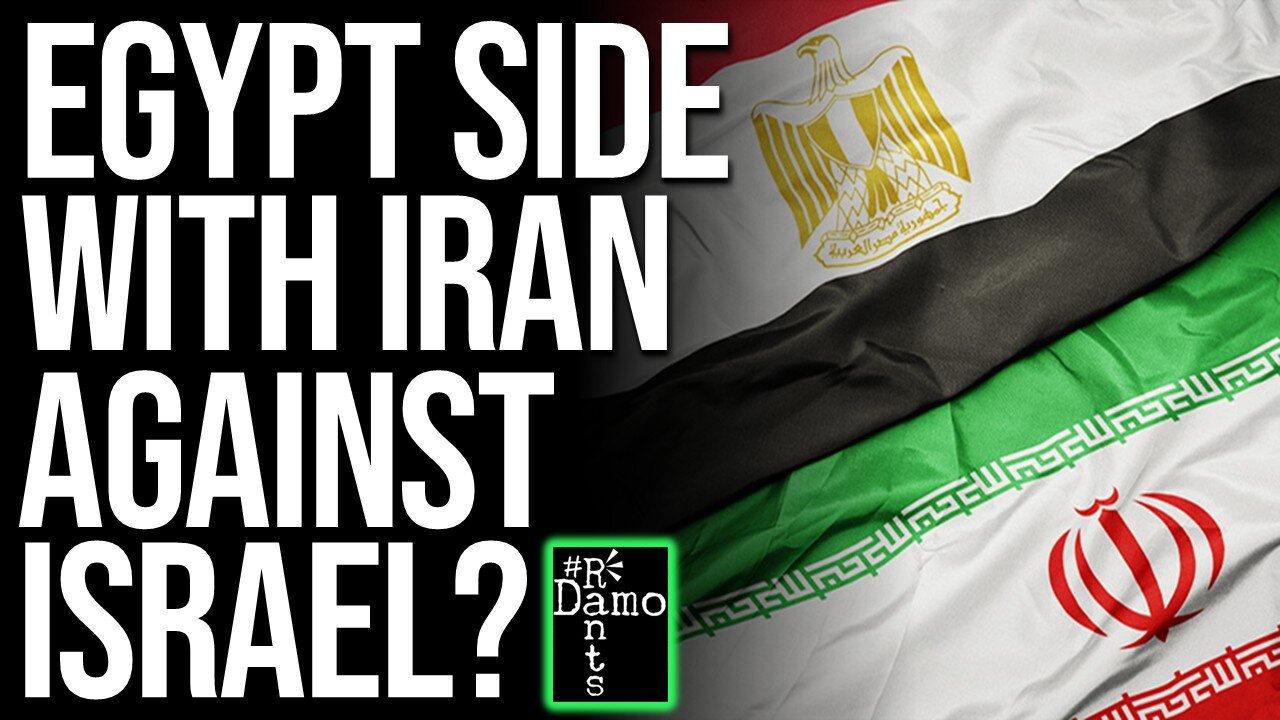Premium Only Content

Egypt Just Sided With Iran - And Israel Is Freaking Out!
Right, so Israel has always counted on Arab mediators to play the clean up crew of its wars — sweeping up the debris of various failed ceasefires while Tel Aviv kept the bombs falling. But by striking Doha during negotiations and plotting hits in Cairo itself aimed at negotiators too, it has managed the diplomatic equivalent of torching the broom cupboard. Qatar is incensed, but it is Egypt that has shifted gear. Bound to Israel by gas contracts and the Camp David Peace Accords, Cairo was supposed to play the safe broker. Instead, Sisi’s government is dusting off the blueprint for a Pan-Arab NATO - egged on by Iran no less - a military pact that would treat attacks on Arab sovereignty as acts of war. It is a massive pivot: the peace partner turned potential spearhead. The question now is whether Egypt can really rally Arab states into a unified force of mutual benefit, or whether this gambit will implode like every joint force attempt that came before it, risking Israel coming for each of them next.
Right, so last week as we know, Israeli missiles fell on the Qatari capital of Doha, a city hosting ceasefire talks. The supposed mediator’s capital became a warzone. Qatar’s Prime Minister, Sheikh Mohammed bin Abdulrahman Al Thani, called the strike “barbaric” and “treacherous terrorism,” a violation of sovereignty and a direct attack on the very possibility of peace.
Days later, as I covered in a video yesterday, Egypt revealed that it too had been targeted. Security services uncovered what they said was an Israeli plot to assassinate Hamas leaders on Egyptian soil. Cairo warned that any such act would be treated as a declaration of war, 40,000 troops outside the gates of Rafah now appearing to demonstrate they mean business. The message, no matter how much the apartheid blue and white state’s allies might try and spin out of this, is unmistakable: Israel, in its obsession with impunity, has decided to burn the bridges of mediation itself. They do not want a ceasefire and they don’t care who knows that now. By bombing Doha and plotting against Cairo, it was not negotiating in bad faith — it was trying to kill negotiation altogether.
Israel once more announces to the world that it is a rogue state. It cannot plausibly claim to want ceasefire while bombing mediators. It cannot demand Arab cooperation while treating Arab capitals as expendable. For decades, Israel exploited Arab intermediaries as shields, allowing it to wage war while maintaining the pretence of diplomacy. But Doha and Cairo reveal the farce: Israel does not tolerate mediators, it targets them.
So what to do about it then? Well in response, and in addition to those 40,000 troops now apparently sitting outside the gates of Rafah, better fit they were knocking it down and getting aid in, but then Palestinians might enter Egypt of course and Sisi won’t go that far; Egypt has gambled on something else and is on the same page as Iran no less in doing so. Long bound to Israel by the Camp David Peace Accords as Egypt is, dependent on US aid, and now having recently signed up to be Israel’s largest gas client, Cairo is nonetheless reviving a long mothballed project all things considered: the creation of a Pan-Arab joint defence alliance, styled on NATO, to hold Israel to account in the interests of mutual protection amongst Arab nations. Whether this actually comes of something this time or collapses into another mess of individual state interests as it has done before, remains to be seen. It’s all a question of how much do these Arab states now see Israel as a threat, now that the Hasbara no longer works and the world sees the pariah state for the pariah it really is.
Doha, if we come back to that for a moment to set the scene was Washington’s chosen ground for negotiation. Yet Israel justified the strike with its usual invocation of “retaliation” — as if bombing a mediator’s capital was just another move in the cycle of vengeance. You cannot negotiate with one hand while launching missiles with the other, yet this was Israel’s play and they’ve been damned for it, no hiding the optics of what they did here, Qatar was no threat to them, but Israel does what it likes.
Therefore the Arab-Islamic summit which has convened in Doha since hass filled with perfectly justifiable fury. Draft resolutions warned that continued Israeli attacks on Arab capitals threatened to shatter normalisation altogether. The Organisation of Islamic Cooperation declared the strike a blatant violation of international law. The attack revealed Israel did not want a ceasefire. It wanted escalation, intimidation, and the destruction of any neutral table that ceasefire talks could possibly take place at.
The foiled plot in Cairo only reinforced the point. Egypt was not just a mediator; it had just signed up to be Israel’s largest gas partner. Yet Tel Aviv, drunk on impunity, was apparently willing to treat it like Gaza. This is why Iranian official Ali Larijani has warned Arab regimes that endless conferences with no action, a swipe at this OIC summit, were nothing but “licenses for annihilation.” At the very least, he argued, a joint operations room would be enough to unsettle Israel and its masters. His point is I think an extremely valid one: without deterrence, sovereignty itself cannot survive, not with a neighbour like that.
Egypt’s position therefore, Arab NATO on one hand, Israel’s biggest gas customer on the other is riven with contradictions, but it is precisely these contradictions that explain its new defiance as well. There is a logic here.
Back in August, Israel’s Leviathan consortium signed a deal to supply Egypt with 130 billion cubic meters of gas worth $35 billion through 2040 — the largest export contract in Israel’s history. For Cairo, battered by economic crisis, a crisis that’s got President Sisi plastered all over it, the deal was something of a lifeline. It guaranteed cheaper energy and preserved Egypt’s role as an LNG hub for Europe – a gas supply for European nations being encouraged to switch from Russian supplies in light of the Ukraine war. Therefore on paper, this dependence should you might think, have made Egypt far more pliant. Let’s face it, that’s been Sisi’s position for quite some time anyway hasn’t it?
But this dependency actually cuts both ways. Israel now depends on Egypt as its export corridor to flog its gas. With the ink barely dry, Tel Aviv cannot easily rip up the contract, its very difficult to undo such a deal, complex as it is by either side. As such, this has actually given Cairo the confidence to stiffen its spine a bit. By exposing the foiled plot, warning of war if its soil is violated, moving troops to Rafah as they did last month, we aren’t actually sure when Egypt exactly uncovered this plot, just that they had, and proposing a Pan-Arab version of NATO, Egypt is wagering that Israel will not risk destroying its own golden goose and the revenues that will come from its gas getting into Europe.
So here lies the paradox: Egypt’s partnership with Israel gives it leverage to confront Israel. Far from silencing Cairo, the gas deal may have actually emboldened it. By reviving the idea of a 22-member joint Arab force with rotating command and at least 20,000 Egyptian troops pledged, Cairo is repositioning itself as defender of Arab sovereignty. Where Iran offers operations rooms and militias, Egypt offers treaties and armies. Two nations here, speaking up for the same thing, offering different skills and facility, that you wouldn’t necessarily, given Israel’s relationship with both, to be on the same page so to speak.
Qatar’s fury has provided the emotional and political spark for Egypt’s harder line. Sheikh Mohammed bin Abdulrahman Al Thani called the strike “treacherous” and vowed there could be no leniency. At the OIC summit, he cast the attack not as an isolated outrage but as a precedent that endangers every Arab capital. If Doha can be bombed during ceasefire talks, then Riyadh, Abu Dhabi, and Cairo are no safer.
Qatar does not seek to lead a military alliance here, it has relied on the US for its security for decades and that’s bitten them on the backside now. Its identity is bound up with mediation and soft power. But its outrage collapses the space for complacency too. By branding the strike state terrorism and demanding consequences, Doha forces fellow Arab states to reckon with the fragility of their own sovereignties. Egypt’s proposal slots into this mood: Qatar’s outrage supplies the legitimacy, Cairo the muscle.
Larijani’s intervention matters not because Arab regimes will adopt Iran’s model wholesale, but because it highlights the absurdity of endless meetings and summits and communiqués where nothing changes, it’s just all talk. He urged governments to form at least a joint operations room, arguing even that would panic Israel’s patrons, a bare minimum but something at least. His warning was caustic: by doing nothing, Arab regimes were signing their own death warrants. He might have done well to flash around that map of Greater Israel like Netanyahu flashed around that cartoon bomb to the UN to make his point, he at least would have been speaking more honestly.
Egypt’s proposal does differentiate itself from this Iranian model in some ways though. Where Iran offers militias and informality, Cairo offers treaties, command structures, and legitimacy under the Arab League. For Gulf monarchies anxious about Iranian influence, this distinction is crucial. Yet the tension remains: the logic is the same. Both models rest on one conclusion — that without deterrence, Israel will keep crossing red lines until no Arab capital is safe.
The Gulf monarchies remain the swing players even now though. Saudi Arabia supported strong language at the Doha summit, warning that continued Israeli strikes could jeopardise normalisation, yet they always say that don’t they? Dangling normalisation with Israel like a carrot but never taking the final step. But Crown Prince Mohammed bin Salman’s priority is his Vision 2030, not confrontation. Riyadh will talk tough but hesitate to commit troops.
The United Arab Emirates is even more compromised. Normalised with Israel through the Abraham Accords and joint ventures as they are, it thrives on portraying itself as a hub of stability. Abu Dhabi condemned the strike, but it knows a Pan-Arab NATO could make Dubai a target, even though Dubai could be as much a target as anywhere else as Doha proved. Besides, they don’t jump unless the Saudis do as a rule.
Kuwait is more straightforward. Its parliament and people remain resolutely hostile to Israel, having resisted normalisation altogether. Kuwait will almost certainly endorse Egypt’s plan, but its military contribution will be limited because it is a small state. Oman will play its customary balancing act remaining neutral. Bahrain, dependent on Riyadh and the US Fifth Fleet, will simply follow Saudi lead as the UAE does.
So here lies the strategic fault line. Egypt is demanding commitment; the Gulf prefers leverage without risk, yet that has proven ineffectual. Whether Cairo can convert rhetorical fury into tangible pledges or refocus minds on the heightened threat now posed to them all by Israel still remains uncertain. These Gulf states seem to navel gaze like nobody else even in the face of real threat. Without Gulf money and troops, a Pan-Arab NATO risks looking hollow, they have the finance to back this, its finding the right stick to poke them with. Because if Gulf states continue to hedge, they risk exposing themselves to the very implosion of sovereignty they fear.
For Hamas, the Doha strike was vindication though wasn’t it? Palestine has been attacked for years, now all of a sudden a mediator state has been and Israeli impunity exposed like never before. It called the attack terrorism, which of course it was, and urged Arab and Islamic states to unify. It demanded sanctions and boycotts. And it insisted its ceasefire demands remained intact. From Hamas’s perspective, Egypt’s Pan-Arab NATO strengthens its leverage. They’ve a lot to gain from this, evenif they have little to offer it I suppose. But fundamentally, the more Arab states align against Israel, the less Israel can dictate terms.
But Hamas also knows it risks being marginalised further, though given it has already agreed to cede sovereignty in exchange for peace, at this point I don’t think its necessarily an obstacle. An alliance of states that excludes Palestinian voices risks becoming another elite project. Cairo must balance state interests with Palestinian legitimacy, Sisi does love to claim they have that even if his actions haven’t convinced many of his conviction. But without that, a Pan-Arab NATO could implode before it begins, trapped between public expectations and regime caution.
That’s not to say the obstacles aren’t enormous to this. Economic interdependence with Israel runs deep for Egypt and flexing thinking they have leverage can go both ways. US leverage is constant. Arab divisions and self-servitude remain entrenched. Regimes fear instability more than they fear Israel. Past attempts at Arab unity collapsed into irrelevance as a result. So is this time really any different? Has anything changed enough?
I think it could be. Israel’s overreach in Doha has torn the very concept of mediation to shreds Sovereignty no longer looks secure. Arab publics are enraged. Leaders know that if they offer only words, then the words of others, such as Larijani’s warning will echo: they are signing licenses for their own annihilation. Their indifference may be putting their own people at risk
The risk is that Egypt’s initiative collapses under its own contradictions. If Gulf states remain sat on the fence, if Washington applies sufficient pressure, or even incentive, knowing how some of these Gulf monarchies think, then the project could die at birth. That would not just be a diplomatic failure. It would confirm to Israel that it can bomb Arab capitals with impunity, shattering Arab credibility for a generation. That would be the worst case scenario here, doing nothing, or not doing enough, gives Israel licence.
An Arab NATO however would reshape the region and beyond. The United States would face a painful choice: to back Israel unconditionally as they do now, and potentially alienate Arab energy partners, or rein in its ally. Europe, dependent on Egyptian LNG as it refutes Russian supplies, would have to confront its own contradictions. BRICS powers would seize the opening, positioning themselves as allies of Arab sovereignty against Western hypocrisy, Egypt and Iran of course both already being BRICS nations.
Ultimately these leaders need to ask themselves if their sovereignty will mean anything if Israel can bomb mediators without consequence in any of their territories? Or will Arab states act collectively, proving that Israel’s impunity does have limits?
Doha and Cairo have exposed the farce. Israel is not negotiating; it is assassinating the very concept of negotiation. By targeting mediators, it has revealed itself as a rogue state, contemptuous of diplomacy and sovereignty alike.
Egypt’s call for a Pan-Arab NATO, with Iran backing such a call for something to shift is therefore not a symbolic gesture but a desperate necessity. It is the attempt to turn outrage into deterrence, dependency into leverage, and Arab disunity into a shield. Cairo may yet succeed in forging a collective defence, or it may watch the project implode once more, having been resurrected, under the weight of the same old contradictions.
That uncertainty is the cliffhanger. If Arab leaders act, Israel could face a deterrent it is well overdue a reckoning with. If they falter, Israel will read it as license to escalate again, perhaps in Amman, perhaps in Cairo itself and successfully this time, frankly is anywhere off limits? Probably not. The choice for the Middle East here is deterrence or implosion. One more conference without action, and the annihilation Larijani warned of will no longer be rhetoric. It could well prove to be reality.
For more on the story of Egypt having sent 40,000 troops to the Rafah border, already causing Israel to lose the plot even if nothing comes of this latest call, get all the details of that story in this video recommendation here as your suggested next watch.
Please do also hit like, share and subscribe if you haven’t done so already so as to ensure you don’t miss out on all new daily content as well as spreading the word and helping to support the channel at the same time which is very much appreciated, holding power to account for ordinary working class people and I will hopefully catch you on the next vid. Cheers folks.
-
 LIVE
LIVE
Nerdrotic
2 hours agoStar Wars is DEAD! | Is Hollywood Killing Pop Culture | WB for sale - Friday Night Tights 377
1,452 watching -
 27:54
27:54
Michael Franzese
1 hour agoDeep Dive Into The Epstein Crime Scene Mystery
3.96K3 -
 LIVE
LIVE
Dr Disrespect
6 hours ago🔴LIVE - DR DISRESPECT - BATTLEFIELD KILL CHALLENGE - vs BOBBYPOFF
2,217 watching -
 1:08:45
1:08:45
DeVory Darkins
4 hours agoLetitia James drops frantic speech after pleading not guilty as Canada gets NIGHTMARE NEWS
36.3K24 -
 LIVE
LIVE
ahdedazs
27 minutes agostage gameplay
115 watching -
 2:06:30
2:06:30
Tucker Carlson
5 hours agoCheryl Hines: Stories From “Curb Your Enthusiasm” and Sticking by RFK on His Way to the White House
144K79 -
 13:25
13:25
Cash Jordan
5 hours ago“INVASION” Convoy JAMS Freeway… ICE “Armored Units” FORCE Illegals BACK TO MEXICO
10.1K16 -
 LIVE
LIVE
Major League Fishing
8 days agoLIVE! - Fishing Clash Team Series: Patriot Cup - Day 3
261 watching -
 LIVE
LIVE
Times Now World
15 hours agoPUTIN PRESSER LIVE | “We Won’t Be Intimidated” — Moscow Warns U.S. After Trump’s Oil Sanctions
160 watching -
 18:35
18:35
Odd Man Out
2 days agoFrance's shame of the century all for DEI pandering
18.8K90